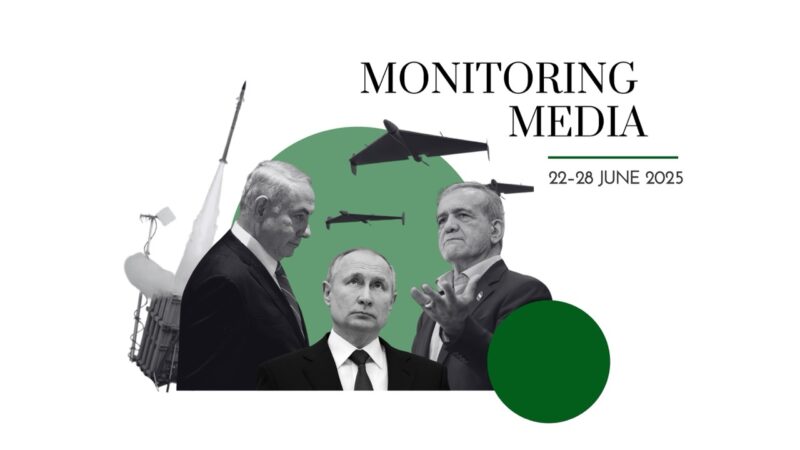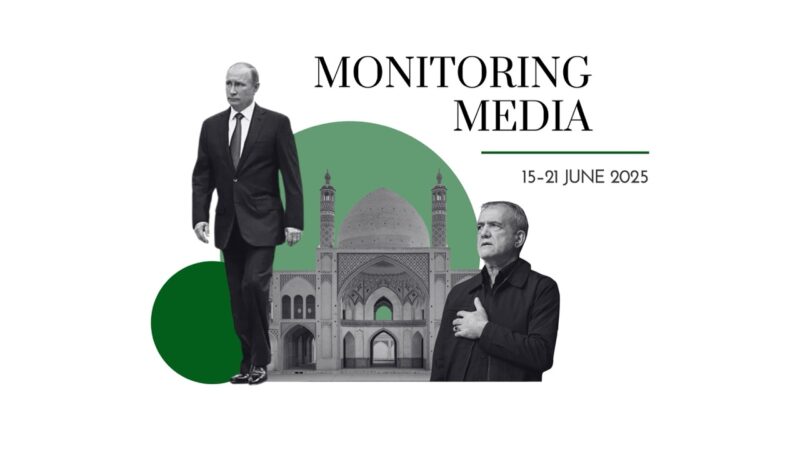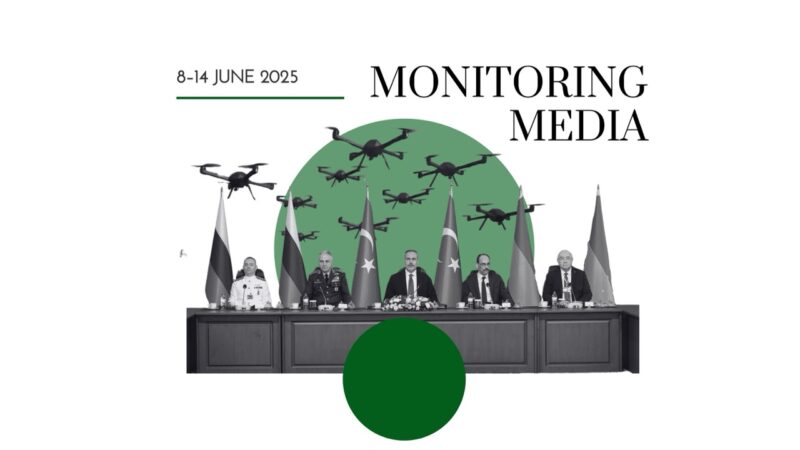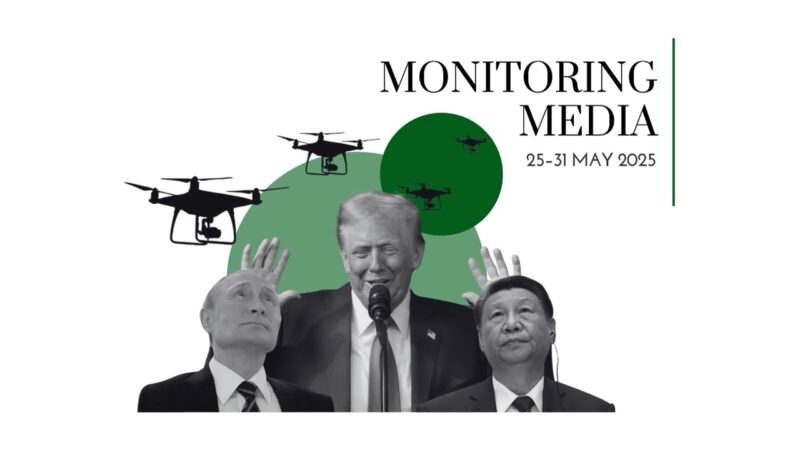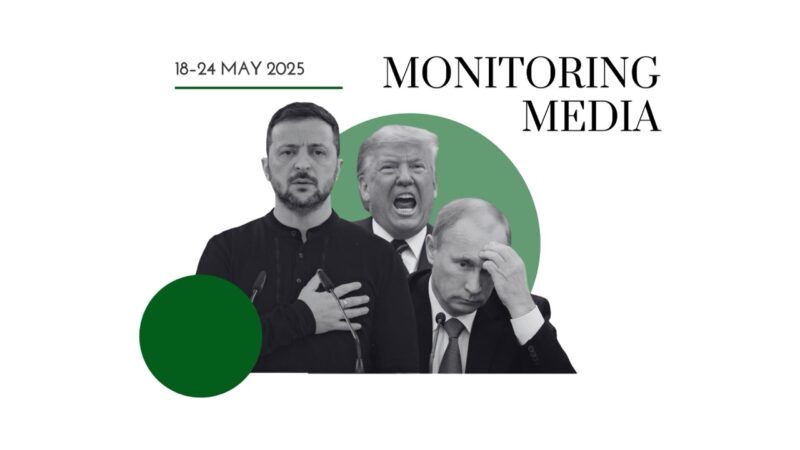West’s frivolity is costing Ukraine dearly

CIUS weekly report on North American media coverage of Ukrainian affairs, 11–17 February 2024
Four publications (Globe and Mail, Foreign Affairs, Wall Street Journal, and National Interest) were selected to prepare this report on how Ukraine has been portrayed in the North American press during the past week. The sample was compiled based on their impact on public opinion as well as on their professional reputation, popularity among the readership, and topical relevance. These publications represent centrist viewpoints on the political spectrum.
This MMS report covers only the most-read and relevant articles about Ukraine, as ranked by the respective North American publications themselves in the past week. Its scope covers promoted articles on home pages and articles from special sections on Ukraine, with the hashtag #Ukraine, from the paper editions of the publications, and about Ukraine from opinion columns and editorials.
Topics featured in the selected articles:
- The world and Ukraine: Ukraine deserves a long-term financial commitment from Canada; the West’s frivolity is costing Ukraine dearly.
- Russia at war: Moscow cooperates with the Axis of Resistance; Russian Navy weaknesses are multiplying.
MMS summaries:
Ukraine deserves a long-term financial commitment from Canada. Eugene Lang and Vincent Rigby (Globe and Mail) argue that Ukraine deserves a long-term financial commitment from Canada. Ukraine’s victory will depend on the supply of military equipment and ammunition from its allies and the ability of their defence industries to help meet Kyiv’s needs. Canada does not have a long-term plan to support Ukraine, and this needs to change. Helping Ukraine to win is not only about justice but also about NATO’s security and guarantees of peace with other autocratic states. Since the beginning of Russia’s war against Ukraine, Canada has provided Kyiv with $2.4 billion in military aid. According to the authors, “It sounds generous, but is marginal in terms of Ukrainian needs.” According to some estimates, “Russia will spend 7 per cent of its GDP on defence in 2024—double the U.S. percentage.” Canada’s contributions have been “ad hoc and piecemeal,” and it “ranks 17th in the world in military assistance to Ukraine as a percentage of GDP.” Ottawa should focus on a long-term financial commitment to provide logistical support to Ukraine until Kyiv reaches acceptable conditions. According to Lang and Rigby, “This would demonstrate Canadian leadership: the first G7 and NATO state to make a predictable, permanent annual financial/materiel commitment to the Ukrainian war effort. It would set an example, help restore Canada’s sagging international reputation, and get noticed in Washington, which remains deadlocked over its own support for Ukraine. Most importantly, it would contribute to Canada’s national security and that of our allies.”
Moscow cooperates with the Axis of Resistance. Hamidreza Azizi and Hanna Notte (Foreign Affairs) observe that over the past two years, Moscow has strengthened its ties not only with Iran but also with the Axis of Resistance, a “network of Iranian partners and proxies that stretches from Lebanon to Iraq.” According to the authors, the network “includes Hamas, Hezbollah, the Yemeni Houthis, and Iraqi and Syrian militias,” which are Moscow’s natural allies in its confrontation with the US. The war in Gaza reveals Moscow’s strengthening ties with Axis powers, in opposition to the United States and its allies: “Russia stepped up its diplomatic support for Hamas and the Houthis, defending their actions before the United Nations and blaming their attacks on the United States. It has provided technical and logistical aid for the axis as it strikes Israeli soldiers.” However, according to the authors, cooperation between Russia and the Axis of Resistance is limited, as both sides have different goals: “The Kremlin likely wants to tie down American resources in the Middle East, while the axis wants to oust U.S. forces.” Azizi and Notte emphasize that Russia and the axis “view each other as comrades-in-arms in a broader effort to weaken the West’s dominance. If Washington is serious about disrupting each one’s schemes, it must stop them from working together.”
Indifference is expensive. Chris Alexander (Globe and Mail) declares that Ukraine is paying the price for the West’s indifference to Russia’s leadership. Western countries did not react decisively to Russia’s aggression against Ukraine in 2014 and occupation of Ukrainian territories, which emboldened Moscow to launch a full-scale invasion in 2022. According to Alexander, Russia’s bloody invasion of Ukraine was due to a “misreading of Mr. Putin and his clique by Western political and business leaders, who saw them as the viable partners some wanted them to be, rather than the architects of subversion and revanchist aggression that they are.” To preserve the era of democracy, Russia must be defeated and Ukraine must win a decisive victory. The author further opines that Canada should allocate 1% of its GDP—about $20 billion—in military support for Ukraine. In turn, Ukraine’s allies should do the following: (1) bring Kyiv out of the strategic grey zone and into NATO and the EU; (2) dedicate NATO resources and other capabilities to Ukraine’s victory in the war; (3) give a green light to Ukrainian attacks on Russia using long-range weapons; (4) dismantle Russian spy networks; (5) deny Moscow more oil revenues by “lowering the sanction price cap”; (6) supply all of Kyiv’s ammunition needs; (7) enable Ukrainian air, artillery, air defence, drone, and naval supremacy; (8) provide Ukraine with the reserves of Russian central banks; (9) institute proceedings against the Russian command for war crimes; and (10) expel Moscow from the UN Security Council and other international bodies. According to Alexander, the greatest challenge today is not the fin-de-régime Moscow, but ourselves: “If we stay weak, Ukraine will struggle, the Kremlin’s current gang will stay and a Crimea-style attack on a NATO member in the Baltic states may happen sooner rather than later. If we back Ukraine’s victory, the hollow edifice of Moscow’s fascist regime will come crashing down.”
Ukrainian soldiers brace for critical shortages as US aid is delayed. Alistair MacDonald and Ievgeniia Sivorka (Wall Street Journal) warn readers that the situation in “Ukraine’s war against Russia” [sic] is dire. Ukrainian soldiers are facing critical shortages of ammunition and supplies due to delays in US military aid that are caused by political wrangling in Washington. Republican congressmembers’ attempts to block additional aid threaten to exacerbate the already difficult situation, leaving troops on the eastern front struggling to conserve ammunition and resources while fending off Russian assaults. In the authors’ interview with one of the soldiers, Oleksandr Kucheriavenko declares that the lives of Ukrainian soldiers depend on US funding. Despite the uncertainty surrounding future aid, Ukrainian soldiers are determined to persevere in the face of adversity. Lt. Oleksandr Shyrshyn describes the grim reality, acknowledging that while they must continue the fight for survival, the consequences of reduced funding would be severe, leading to increased losses: “We have to continue, this is a question of our survival…but the losses would increase, we will lose more territory and more people.”
With Western support, Kyiv can expel Russian forces from the east. Wesley Clark (Wall Street Journal) argues for a strategic shift in both Ukraine and the United States’ approach towards the ongoing war with Russia. Clark suggests that Ukraine should adopt a more comprehensive and Eisenhower-style strategy to reclaim its territory, emphasizing the need for detailed planning, advanced reconnaissance, and the use of modern warfare technologies. The author contends that such a strategy, coupled with increased support from the US and NATO allies, would provide Ukraine with a viable path to repel Russian forces and secure its borders. “For Ukraine, this is a matter of national survival. For the West, it is an opportunity to secure Europe and the rules-based international order at minimum cost and risk,” Clark writes. Drawing parallels with the Allied invasion of Normandy during World War II, Clark underscores the importance of timely and sufficient resources in achieving military objectives. He highlights the need for a concerted effort from Western powers to provide Ukraine with the necessary aircraft, munitions, and armoured vehicles to execute a successful counteroffensive. The author warns against underestimating the costs and risks involved, urging stakeholders to recognize the gravity of the situation and act decisively: “Ukrainians have the same drive to liberate their country but need the sufficient and timely resources that much of the West hasn’t yet provided.”
Ukraine needs Western assistance to win the fight. Jillian Kay Melchior (Wall Street Journal) interviews former president Petro Poroshenko—who remains optimistic despite the harrowing losses and growing direness of Ukraine’s situation without adequate military support. He emphasizes the strategic significance of continued US military support, which he sees as pivotal in offsetting Russia’s numerical advantage and preventing further escalation of the war. Poroshenko underscores the personal toll of the war, reflecting on the sacrifices made by friends and comrades, yet he finds hope in the potential for international assistance to bolster Ukraine’s defence capabilities. “Such losses take on a strategic significance as Western support for Ukraine wanes,” Melchior writes. “Since Vladimir Putin launched his full invasion two years ago, Kyiv and its Western supporters have divided defensive responsibilities: Ukraine provides the people; the West supplies the weaponry.” The author explains that Poroshenko’s optimism is grounded in the belief that Ukraine’s plight is not only a matter of national survival but also a crucial test of Western commitment to collective security and democratic principles. The former president stresses the need for continued dialogue and engagement with USA and other Western allies, urging a shift from reliance solely on political promises to proactive efforts to garner support from the American public. As Ukraine waits for weapons from the West, Poroshenko said, “the price for every single day, or the price for every single hour, is rising dramatically…. Those who will read your article cannot imagine what it means, every single week, to be at the funeral of your friends.”
Russian Navy weaknesses multiply. Maya Carlin (National Interest) reminds readers that over the past two years Moscow has faced substantial attrition in terms of military hardware and personnel, severely undermining the combat effectiveness of its armed forces. The Russian Navy, in particular, has suffered serious setbacks—notably with its flagship aircraft carrier, the Admiral Kuznetsov, remaining inactive for years. Furthermore, persistent attacks by Ukrainian forces on Russia’s Black Sea Fleet have inflicted damage on submarines, frigates, and other naval assets, compelling Moscow to relocate some vessels to less vulnerable areas. Ukraine’s success in targeting Russian naval assets has not only weakened Moscow’s military capabilities but also imposed logistical burdens, complicating its maritime operations. Furthermore, by disrupting Russian naval operations and establishing blockade-breaking maritime corridors Ukraine has demonstrated its ability to exert pressure and maintain economic resilience amidst the war. The potential interruption of Russia’s seagoing trade, particularly its vital oil exports, poses additional economic challenges for Moscow, compounding its financial strain amid international sanctions. Russia faces a prolonged period of military rebuilding: “As the invasion rages on, Russia is just adding more time it will need in the aftermath to rebuild its military structure, forces and modern capabilities.”
